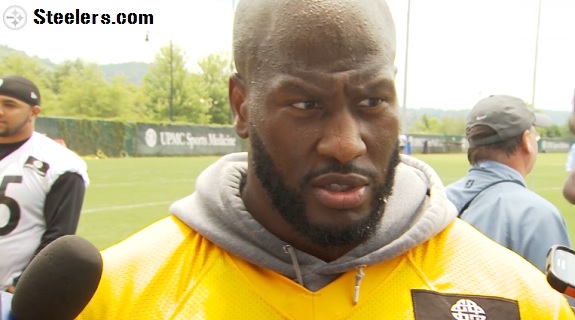By now most of you are probably aware of the fact that New York Giants defensive end Jason Pierre-Paul suffered a horrific fireworks accident on the fourth of July, the results of which are an amputated right index finger and a broken thumb. This was first reported last night by ESPN ace reporter Adam Schefter, who tweeted out that ESPN had “obtained medical charts that show Giants DE Jason Pierre-Paul had right index finger amputated today”, in addition to posting an image of said medical chart.
Of course, Twitter immediately went into an uproar, with many citing a violation of HIPAA by Schefter for the reporting of the news and the releasing of the image of Pierre-Paul’s medical chart, which should be private information. Pittsburgh Steelers linebacker James Harrison led the charge, tweeting the following back at Schefter:
Now, obviously Steelers fans will revel in the fact that one of the baddest men to ever lace up cleats was as direct and blunt as we hoped he’d be, but the question still remains, is Harrison right to be furious with Schefter? Did the reporter cross a line that simply shouldn’t be crossed?
Our own Alex Kozora kindly cleared up the legal aspects of the incident last night with this story, clarifying that HIPAA exists to prevent medical facilities from releasing a patient’s private information, not to prevent anyone else from obtaining that information. The idea behind the law is obviously to protect the private rights of patients, making the process all but impossible for the media to circumvent without the treated person’s approval.
The illegal onus in this regard should fall squarely on the hospital then, not on Schefter. It is the ESPN reporter’s job to dig up as much truthful information on this story as possible, regardless of how he obtains it. As long as the process does not involve illegal actions to gather this information, Schefter is simply doing exactly what he has been hired to do. It isn’t ESPN’s fault that Schefter could find dirt in a snowstorm (name that movie!), and the reporter certainly shouldn’t receive any legal backlash for his actions.
The question then becomes, should Schefter have avoided posting Pierre-Paul’s medical chart out of a moral obligation? I must admit, I find it humorous that anyone in the 21st century still holds news organizations to a moral standard, a refreshing thought, albeit not very realistic in today’s day and age. However there is certainly a moral standard, whether companies like ESPN adhere to it or not, and questioning whether or not that standard was violated is a valid concern to raise in this incident.
In a situation like this, the first thing I examine is whether or not anyone could possibly be hurt, emotionally, mentally, physically, or in any other way, by the releasing of such information. I think the answer in this case is clearly no, Pierre-Paul’s injury had already occurred, and there was no way he was going to be able to hide an amputated finger from the team or anyone else when he was released from the hospital. The world was going to find out eventually, the only question was, how?
You can argue that Pierre-Paul has the right to announce such news on his own terms, and you’re absolutely correct, he does. Those rights were violated when the hospital that provided his care allowed private medical information to be leaked to a news source that didn’t hesitate to report it. Schefter, as a reporter of news, took the pertinent information and attempted to inform people of the severity of Pierre-Paul’s injury. That was it, a simple conveyance of the facts that were released by the hospital already, albeit wrongly. Injuries are discovered all the time by reporters, the only real difference in this situation is that Schefter revealed at least an aspect of how he obtained the information by tweeting an image of the medical chart.
Isn’t that just transparency? Obviously displaying the direct individual source would damage Schefter’s credibility as a journalist amongst other future potential sources, but by showing the medical chart, does Schefter really do anything other than strongly substantiate the facts that he was reporting to be true? Shouldn’t journalists do everything in their power to prove the validity of their reports to readers? Isn’t that the type of reporter we’d trust in the future? I know I would.
Were I a reporter in Schefter’s shoes, I would have done the same thing. You can question the morality of it, but his decision really effects no one in the end. Pierre-Paul’s accident is a tragedy, but it is also a reality, and it is news. In the end, that is what people want, and it is Schefter’s job to give it to them by any legal means necessary.
So yes, Harrison and others’ anger is justified, but it is simply misplaced at this time. ESPN has their faults, a multitude of them in fact, but this top-notch bit of reporting by Schefter wasn’t one of them. Direct your ire towards the entity that allowed this information to fall into the media’s hands – as I’m sure Pierre-Paul will when his lawyers sue the source of the leak for every penny they’re worth.








